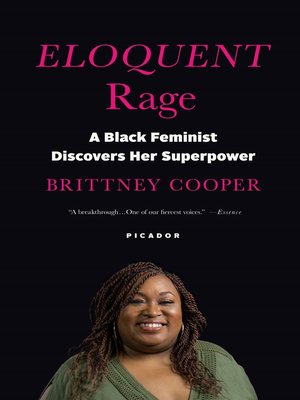

is one of a handful of misapplications of politics-as-personal where Cooper’s pure conjecture bludgeons the personhoods of those she would rather dismiss. With Eloquent Rage, Cooper offers refreshingly honest and vulnerable insights into her life: a mapped journey of Black Feminist awareness as a mirror into herself. If anyone comes to this work expecting a personal memoir to unfold into a course reader on Black feminist thought, know that this is not what you will get. Cooper’s 'Capital B, Capital F' for Black Feminism might also be for Big Feels, as she dives head first into them. The inclusion of optimism and Bible verses are a perfect reminder to continue to smile.Įloquent Rage would be a great title for a furious tirade, but that’s not what it is. After documenting all the BS we’ve endured and will continue to endure, Cooper reminds us that joy comes in the morning. Eloquent Rage is fierce, hilarious, and accessible, versatile enough to be read in college classrooms, coffee shops, and book clubs.

It challenged my understanding of feminism but also made me comfortable readjusting and expanding my current understanding of feminism. The insertion of these tragedies serves as a reminder that Black women are not immune to systemic racism and violence. Cooper’s inclusion of Sandra Bland feels like a way of saying her name. This book discusses Black women’s plight and it is imperative for Black men to read and understand it. Cooper’s book also celebrates where you are right now, as she is very transparent about her process.

Eloquent Rage is for young twenty-something Black girls growing into their womanhood, as well as older adult Black women. This book is for 'grown ass women' it is serious, it is heavy, and it is light. Her chapters are full of snapworthy material that Black women will read and say, 'me too.' Eloquent Rage allowed me to pause, reflect, and find my own superpower.

Cooper captures Black girls’ journey to womanhood by dissecting our experiences with love, family, social systems, and everything in between. Cooper masters the art of intertwining the scholarship of eminent Black feminists such as bell hooks and Audre Lorde with regular Black girl jargon.


 0 kommentar(er)
0 kommentar(er)
